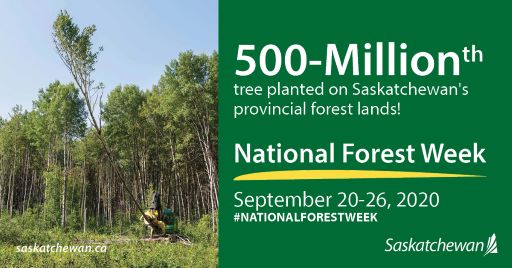Released on September 21, 2020
More Than 500 Million Trees Planted On Provincial Forest Lands
National Forest Week is being recognized this year from September 20-26, marking its 100th anniversary and highlighting the important role that forests play, both for the environment and our economy. Saskatchewan recently reached a historic forestry milestone, as the 500-millionth tree was planted on provincial forest lands.
“Forest land covers 34 million hectares, over half our province, and forestry is northern Saskatchewan’s largest economic sector,” Energy and Resources Minister Bronwyn Eyre said. “The provincial forestry sector, which generates nearly $1 billion in forest product sales annually and supports nearly 8,000 direct and indirect jobs, is showing strong signs of economic recovery.”

Saskatchewan’s forestry industry includes seven large manufacturing facilities, which produce lumber, pulp and panels, and more than 210 small businesses that produce a variety of forest products. Prices for many products are currently at record highs, due to low inventories and record repair and renovation retail sales.
Saskatchewan is home to the largest 100 per cent First Nations-owned sawmill in Canada, and Indigenous people comprise over 27 per cent of the province’s total forestry sector workforce—by far the highest of any province.
Each spring, some seven million trees are planted across the province, and National Forest Week is a good time to remember the importance of sustainable forest management for both government and the forestry sector, which ensures the continued renewal of one of Saskatchewan’s most important natural resources.
“Sustainable forest management promotes healthy forests into the future,” Environment Minister Dustin Duncan said. “Harvested areas in the province are renewed through natural regeneration, tree planting or a combination of the two. Because forests and the forestry industry are so important for Saskatchewan, this is an exciting milestone to celebrate during National Forest Week.”
The theme for National Forest Week’s 100th anniversary is ‘Healthy Forests - Healthy Future’, recognizing the importance healthy forests have on everyone.
-30-
For more information, contact:
Robin Speer
Energy and Resources
Regina
Phone: 306-787-8360
Email: robin.speer@gov.sk.ca

